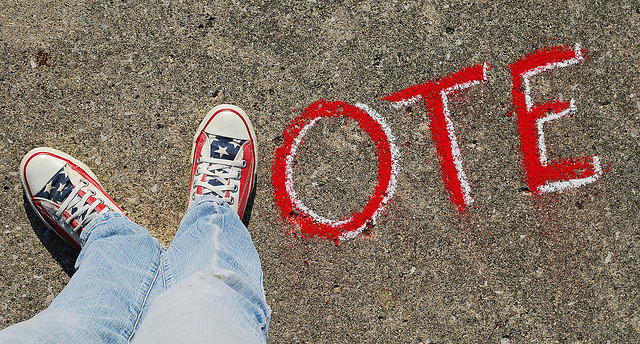To a voter with principles, sometimes voting is the right thing to (not) do
One of the disadvantages of self-identifying as a conservative is that people automatically assume you’re a Republican. This leads to many uncomfortable conversations, as they will have a tendency to impute to you positions you do not hold and hold you responsible for policies you do not support. While it is true that I could probably never bring myself to vote for a Democrat, neither am I able to pull the lever for the Republican candidate. Which means, once again, I may opt out of voting for certain offices altogether.
We don’t live in a perfect world. It’s a standard trope in political science that the perfect is the enemy of the good, and that pursuing the good, or at least the best possible under the circumstances, may involve unsavory compromise. Fair enough, this is politics after all.
But consistently making these choices could have the effect of blinding the party being chosen to its own faults. Conservatives such as myself who favor fiscal restraint and responsibility can hardly throw our support behind irresponsible borrowers. Nor can we support a party that engages in imprudent interventions in foreign lands, believing as we do the words of John Quincy Adams that America “goes not abroad, in search of monsters to destroy.”
Conservatives such as myself worry that we are reduced to making choices between competing plutocrats, the major difference between the two being the types of industries and corporations they will use government power to prop up. We look at the financial troubles of six years ago and see the nation repeating the mistakes, while in the interim government policies have largely enriched the already wealthy and placed further financial obligations on future generations.
Conservatives such as myself worry that the Republican insistence on the thaumaturgic powers of markets and competition has a way of eroding public life. It is not that we oppose markets; we just want them to be genuinely free and fair, and to have limits. We oppose the commodification of all areas of life, the reduction of social good to calculations of costs and benefits, and the latent materialism of political candidates.
Conservatives such as myself resist the nostrums of the pretend economists who drive modern politics. Voters are talked to all the time about that great abstraction The Economy, at whose behest we all serve and on which we are all dependent. We are reminded that the Greek root of the word economy is “household,” and we believe that economic activity, like charity, begins at home. So we are suspicious of economic growth and economic thinking that weakens households and uproots families.
It is impossible to have candidates who will discuss humane economics, healthy markets and accountable politics when their campaigns themselves are being run by professional mercenaries whose ethics would make Machiavelli blush, and being funded by out-of-state interests who want to tilt the power of the national government to their advantage.
Mainly, we resist the distillation of politics and citizenship to the theater of campaigns and the act of voting. “If voting could actually change things,” wrote Emma Goldman, “it would be made illegal.” It may be an expressive act, but it isn’t an effective act. Anthony Downs once observed that you have a better chance of being struck by lightning on the way to the polling booth than you do of having your vote make a difference, so no rational person would go vote. And, as Thoreau said, our commitment to the right ought to be so vigorous that it cannot possibly be captured in the feeble expression of voting.
Conservatives understand that the less localized our politics is, the less important the act of voting is. The vote becomes dissipated, inconsequential, and the resultant government less responsive and accountable. There is a time when the most responsible thing a voter can do is not vote. It is often said that those who don’t vote don’t get to complain, but that simply doesn’t follow. If I, still paying taxes, am forced to choose between two objectionable alternatives, I’m entitled to opt out and complain about the alternatives and bemoan the fact that I can’t do better under the circumstances.
See what new members are saying about why they donated to Bridge Michigan:
- “In order for this information to be accurate and unbiased it must be underwritten by its readers, not by special interests.” - Larry S.
- “Not many other media sources report on the topics Bridge does.” - Susan B.
- “Your journalism is outstanding and rare these days.” - Mark S.
If you want to ensure the future of nonpartisan, nonprofit Michigan journalism, please become a member today. You, too, will be asked why you donated and maybe we'll feature your quote next time!


 Few acts lend themselves to platitudes as easily as our civic duty, but sometimes it’s a bridge too far. (Photo by Flickr user Theresa Thompson; used under Creative Commons license)
Few acts lend themselves to platitudes as easily as our civic duty, but sometimes it’s a bridge too far. (Photo by Flickr user Theresa Thompson; used under Creative Commons license)